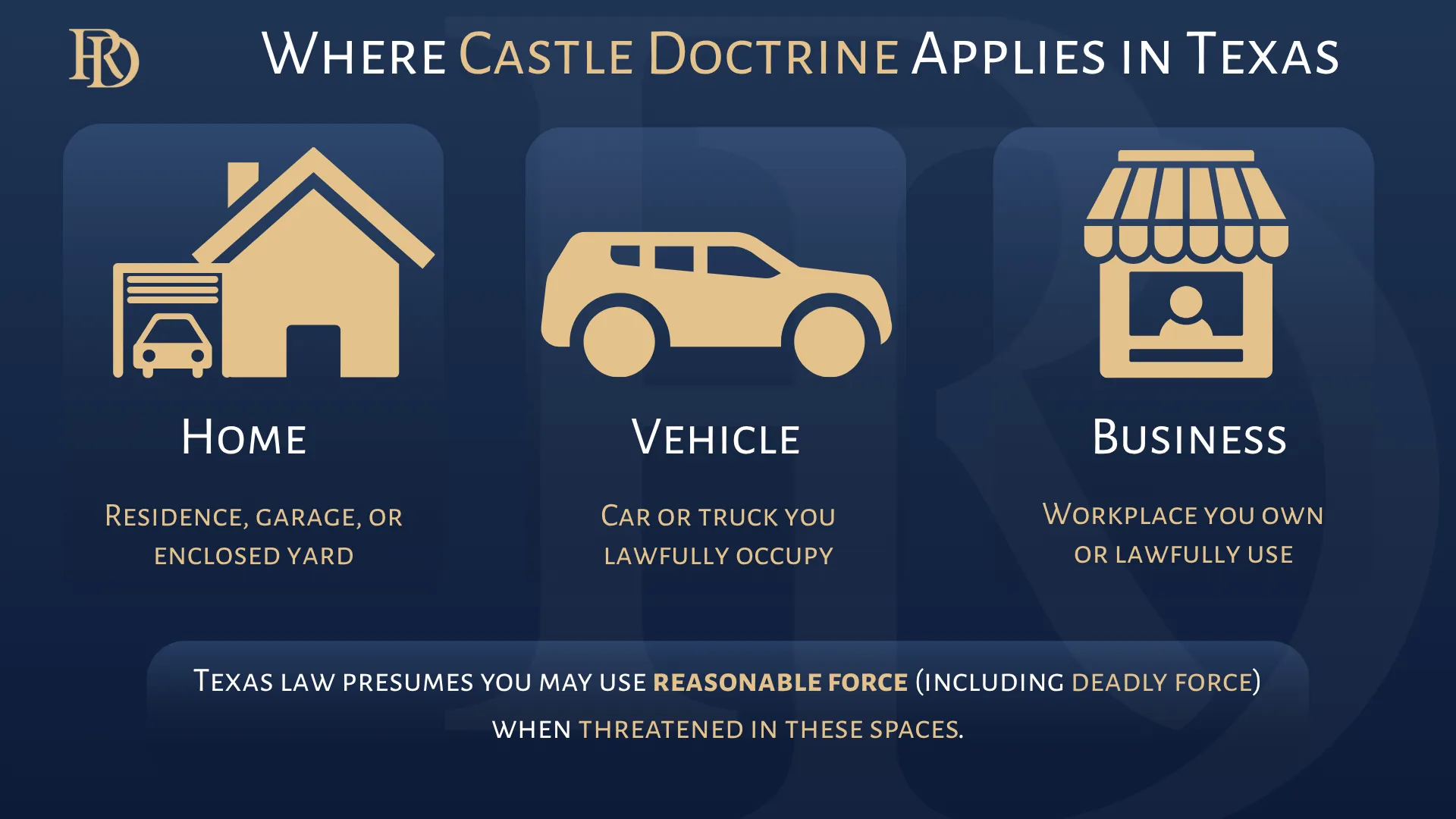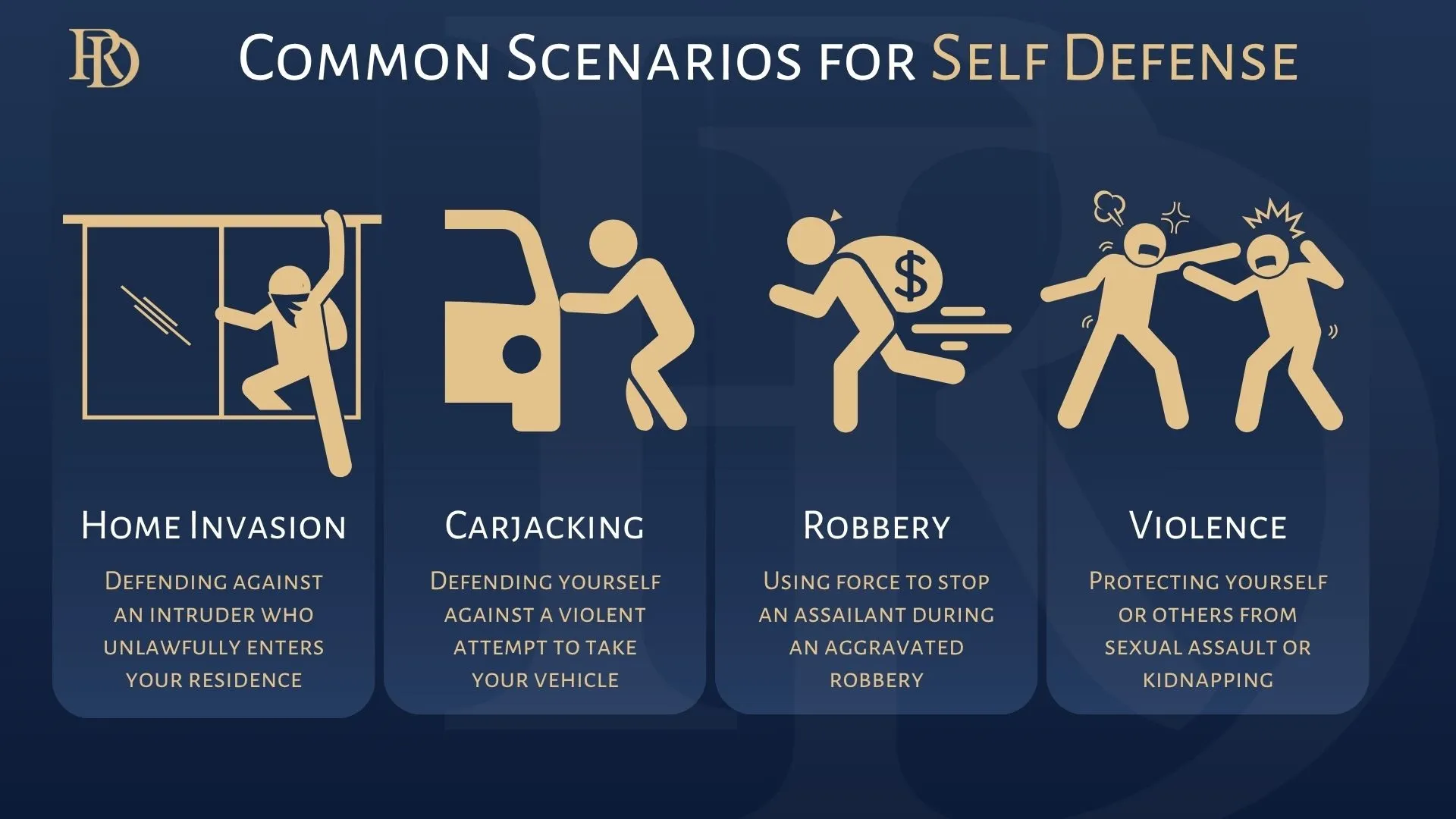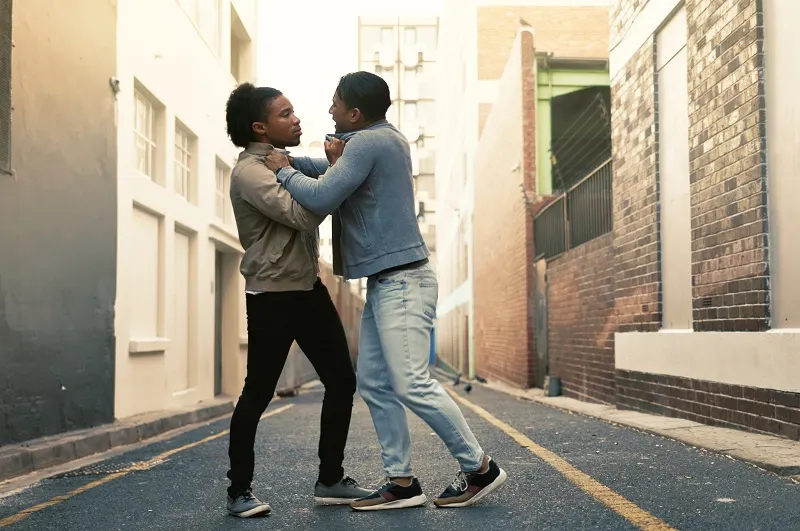
Castle Doctrine: Texas' Self-Defense Laws
Texas law gives property owners and individuals strong protections when responding to threats of violence. The Castle Doctrine in Texas is one of the best-known examples. It allows people, under certain circumstances, to use force, including deadly force, without the obligation to retreat. Still, these cases are rarely simple.
In this article, we’ll explain how the Castle Doctrine works and the types of situations where self-defense may apply. We’ll also discuss how prosecutors build their cases and why you'll still need an experienced criminal defense lawyer who’s an expert in self-defense cases, even if it feels like the law is on your side.
Self-Defense Under Texas Law
The Texas Penal Code outlines the self-defense laws that apply when someone uses force to stop unlawful force or unlawful deadly force.
Castle Doctrine in Texas

The Castle Doctrine (Sec. 9.31 & 9.32) strengthens self-defense protections by recognizing a person’s right to defend themselves in specific places: their home, vehicle, or place of business.
Under the doctrine, you are legally justified in using such force when you reasonably believe it is immediately necessary to prevent:
- Serious bodily harm or imminent death
- Aggravated sexual assault or commit aggravated kidnapping
- Aggravated robbery or committing burglary
- Another person’s imminent commission of a violent crime
This framework means property owners and occupants do not have to abandon these locations when threatened.
Stand Your Ground Laws in Texas
Texas law (Sec. 9.31(e–f) & 9.32(c–d)) also removes the traditional duty to retreat in certain self-defense cases. Commonly known as the state’s version of stand your ground laws, this principle applies outside the home as long as the individual is in a place they have a legal right to be and is not engaged in criminal activity.
In practice, this means that a person may use reasonable force, including deadly force, to protect themselves if they reasonably believe it is necessary to prevent serious bodily injury, imminent death, or other listed crimes, without first trying to escape the situation.
When Castle Doctrine Protections Apply

Under Texas law, the Castle Doctrine may shield you from criminal liability, but only if certain conditions are met. A person must be in a place where they have a legal right to be, such as their home, vehicle, or place of business, and reasonably believe that using force is immediately necessary to prevent serious bodily harm, imminent death, or one of several violent felonies, including aggravated robbery, aggravated kidnapping, or sexual assault. If the defendant was not engaged in any criminal activity, the Castle Doctrine may serve as a complete defense.
Typical situations where Texas self-defense laws come into play include:
- A homeowner was confronted by someone who had attacked them during a break-in.
- A driver facing serious bodily injury during a carjacking.
- A property owner trying to protect their property during an aggravated robbery.
- A person responding to an attempted sexual assault or aggravated kidnapping.
This framework ensures that those defending themselves in their rightful domain are afforded legal protection. It’s important to note, however, that Texas law requires a reasonable belief that force was necessary. Excessive force or responding to verbal provocation alone will not qualify.
When Deadly Force Crosses the Line
Not all situations justify the use of deadly force. The law distinguishes between deadly force to protect against immediate threats and actions that go beyond what a reasonable person would consider necessary.
Protections can fail if:
- You were the initial aggressor or provoked the confrontation.
- The threat arose from verbal provocation only, without physical danger.
- The response involved excessive force — more than a reasonable person would consider necessary.
- Your belief of danger was not reasonable, or nonlethal alternatives existed.
Using lethal force in response to minor criminal mischief or to recover stolen property can lead to criminal charges instead of protection under the doctrine. In such scenarios, prosecutors may argue that the response was unjustified, opening the door to criminal charges like manslaughter rather than immunity under the doctrine.
A prosecutor may argue that the actor failed to act reasonably or that non-deadly force would have been sufficient. In these cases, the Castle Doctrine may not apply as a complete defense.
Common Myths About Texas Castle Doctrine

Several misconceptions surround the Castle Doctrine. Let’s clear up a few:
- “It applies everywhere”: In reality, it’s confined to your home, vehicle, or workplace — not public spaces.
- “Any crime justifies deadly force”: Only threats involving serious bodily harm, imminent death, or violent felony qualify, not minor offenses or property disputes.
- “It eliminates all legal consequences”: Even when lawful, a self-defense incident may lead to investigation, arrest, or potential civil remedies from the other party.
How Prosecutors Build a Case
Prosecutors in Williamson County and across Texas often focus on:
- Whether the defendant faced a substantial risk of death or serious bodily injury.
- If the defendant was engaged in criminal activity at the time.
- Whether the force used was the exact force needed or whether it became excessive force.
- If the defendant had a reasonable belief that the other party posed an imminent threat.
The state must still prove guilt beyond a reasonable doubt, but these factors shape how juries view a self-defense claim.
Defense Strategies in Castle Doctrine Cases

An experienced attorney can challenge the state’s arguments by showing that:
- The defendant acted under a reasonable belief of danger.
- The other party was committing or attempting a violent crime.
- The force used was proportionate and considered reasonable under Texas law.
In many cases, defense strategies highlight inconsistencies in the state’s evidence or emphasize the protections built into the castle doctrine defense. Lawyers may also call on former prosecutors to analyze how the state may pursue the case and craft responses accordingly.
Protect Yourself Under Texas Self-Defense Laws
The Castle Doctrine in Texas gives individuals the right to defend themselves and their property, but these protections are not absolute. Courts will carefully evaluate whether the use of force was truly justified, whether it prevented serious bodily harm or another violent crime, and whether a reasonable person would have acted the same way.
If you are facing criminal charges after a self-defense incident, your future may depend on how well your story is presented in court. Having a Texas Board-Certified criminal defense lawyer who understands the nuances of Texas self-defense laws can make the difference between conviction and a complete exoneration.
Ryan H. Deck has the knowledge and experience to build a strong defense strategy in Williamson and Travis Counties. Contact us today to protect your rights and move forward with confidence.


Texas Board-Certified Criminal Defense Attorney with over 20 years of experience

Target

We Can Protect Your Rights Under Texas Self-Defense Laws
If you are facing criminal charges after defending yourself, the law may be on your side, but you need skilled representation. Call our Texas Board-Certified criminal defense lawyer today.
This is some text inside of a div block.
Lorem ipsum dolor sit amet, consectetur adipiscing elit. Suspendisse varius enim in eros elementum tristique. Duis cursus, mi quis viverra ornare, eros dolor interdum nulla, ut commodo diam libero vitae erat. Aenean faucibus nibh et justo cursus id rutrum lorem imperdiet. Nunc ut sem vitae risus tristique posuere.

Heading 1
Heading 2
Heading 3
Heading 4
Heading 5
Heading 6
Lorem ipsum dolor sit amet, consectetur adipiscing elit, sed do eiusmod tempor incididunt ut labore et dolore magna aliqua. Ut enim ad minim veniam, quis nostrud exercitation ullamco laboris nisi ut aliquip ex ea commodo consequat. Duis aute irure dolor in reprehenderit in voluptate velit esse cillum dolore eu fugiat nulla pariatur.
Block quote
Ordered list
- Item 1
- Item 2
- Item 3
Unordered list
- Item A
- Item B
- Item C
Bold text
Emphasis
Superscript
Subscript



